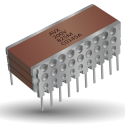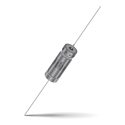Basic Guidelines of Conductive Polymer Capacitors Written By: S. Zedníček | J.Petržílek | P.Vanšura | M.Weaver | C.Reynolds Abstract: Conductive Polymer Capacitors are relatively new solid electrolytic capacitor technology on the market. The range of application is growing also due to their low ESR and safe operational characteristics. The paper addresses frequently asked questions about construction, parametric performance, product life, product specifications, recommendations and applications.
Tantalum / Niobium / Polymer
Capacitors for High Temperature Applications Written By: Martin Barta | Slavomir Pala | Stanley P. Cygan Abstract: Traditionally, the main market for high temperature electronics is the downhole oil and gas industry. However, the avionics, automotive and many other industries also have applications which share the same key requirements of reliability under harsh operating conditions, including high humidity and dust, and the ability to withstand shock and vibration. Resistors and capacitors are ubiquitous in any electronic device and system. The lack of reliable hightemperature, high value capacitors has almost certainly limited growth in these newer applications. Most current capacitor technologies on the market, such as aluminium electrolytics or film capacitors, are limited to a maximum temperature range of 125ºC –
Basic Tantalum Capacitor Technology Written By: John Gill Abstract: This paper covers the general manufacturing techniques used to make a solid tantalum capacitor. The purpose of this paper is to give the layperson an understanding of current tantalum technology.
AVX TWA Series Wet Tantalum Capacitors DSCC 93026 & Beyond Written By: Brian Brunette Abstract: Wet tantalum capacitors have been utilized for many years in high energy storage applications where volumetric efficiency and high reliability are essential requirements. This paper describes the next generation of high CV (capacitance/voltage) wet tantalum technology which is enabling higher efficiency and higher reliability capacitor designs, extending application capabilities.
Application Guidelines on IR Reflow of Surface Mount Solid Tantalum Capacitors Written By: Steve Warden | John Gill Abstract: This paper tries to explain the factors which influence the ability of surface mount solid Tantalum capacitors to withstand present industry standard reflow technologies, and explores the peak temperature trends of industry IR reflow systems. *To assist you with the terminology used within this document a glossary is available through the AVX worldwide sales office
Analysis of Solid Tantalum Capacitor Leakage Current Written By: R. W. Franklin Abstract: The leakage current of a solid tantalum capacitor is the sum of several independent factors. From measurements of leakage over a range of test conditions some degree of separation of these components of the current can be achieved and so the relative importance of factors leading to high leakage can be assessed. There is a background level present directly related to dielectric absorption and it contributes to the loss factor of the capacitor. It is not a true leakage. On top of this absorption current there are other components, most of which are essentially by-passing the bulk of the dielectric. These can be moisture or manganese dioxide
Advanced Test Methods for Up-screened Tantalum Capacitors Written By: Brian Brunette Abstract: Commercial-off-the-shelf capacitors are designed and tested for non-critical applications. AVX has developed a range of “COTS-Plus” tantalum capacitors with testing and reliability grading done in accordance with MIL-PRF-55365 and AVX proprietary methods to provide improved reliability on commercial ratings by removing weaker components within the populations. This paper will describe the criteria for selecting ratings appropriate for up-screening and describe the various tests that are standard and optional to demonstrate the improved reliability that results from these screening methods. Standard and “Space Level” options are described and compared to illustrate the scope of the COTS-Plus system.
A Study of Field Crystallization in Tantalum Capacitors and its Effect on DCL and Reliability Written By: T.Zednicek | J. Sikula | H.Leibovitz Abstract: Tantalum has been the preferred capacitor technology for use in long lifetime electronic devices thanks to the stability of its electric parameters and high reliability. Failure rate performance measurements over time show a decreasing number of failures resulting in practically no wear out – unlike some other capacitor technologies. As in basically any material at temperatures above absolute zero there are processes that can lead to deterioration of the capacitor, there are also self-healing processes that are more effective that result in an overall failure rate reduction. Despite this phenomenon there are some known degradation mechanisms









